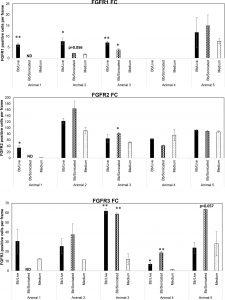Lyme disease, transmitted through tick bites, can cause a variety of symptoms, including neurological problems. While antibiotics usually clear the infection, some patients experience lingering neurological issues like memory loss, fatigue, and pain, often termed post-treatment Lyme disease syndrome. Researchers have identified a promising new avenue for treating these persistent symptoms.

Figure 1 Expression levels of FGFRs from rhesus frontal cortex (FC) in response to live and non-viable B burgdorferi. FC tissue explants exposed to either live or sonicated B burgdorferi for 4 hrs. were probed for FGFR1-3 expression levels by immunofluorescence. Tissue explants exposed to medium alone were used as controls. FGFR positive cells per frame were quantified and graphed. Bars represent standard deviation. * p < 0.05; ** p < 0.01. ND- not determined.
This study explored fibroblast growth factor receptor (FGFR) inhibitors, a class of drugs previously investigated for cancer treatment. The research revealed that FGFR inhibitors significantly reduced inflammation and cell death in nerve tissue samples infected with the Lyme disease bacteria. These findings suggest that targeting FGFR pathways could offer a novel therapeutic approach to tackle persistent neuroinflammation in patients with post-treatment Lyme disease syndrome.
This discovery paves the way for further research aimed at developing treatments that specifically address the underlying inflammation contributing to these chronic symptoms. The ultimate goal is to improve the quality of life for patients struggling with the long-term effects of Lyme disease.
The study involved treating nerve tissue samples with the bacteria, followed by FGFR inhibitor application. While the results are encouraging, further research is needed to translate these findings into effective clinical treatments for patients. This study represents a significant step forward in understanding and potentially managing the complex and debilitating aftermath of Lyme disease.
Journal article: Parthasarathy, G., 2024. Fibroblast growth factor receptor inhibitors mitigate the neuropathogenicity of Borrelia burgdorferi or its remnants ex vivo. Frontiers in Immunology.
Summary by Stefan Botha










